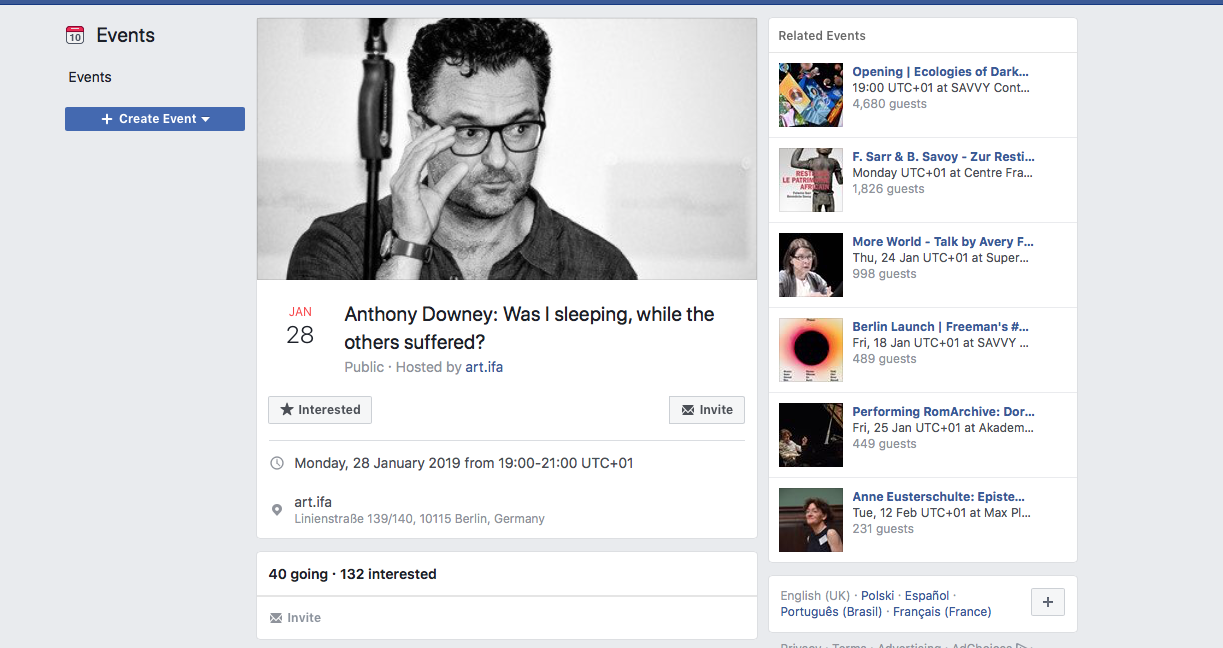Public Talk: Was I sleeping, while the others suffered: Contemporary Art, the Refugee Condition, and the Alibi of Engagement, ifa, Berlin, January 28, 2019

Monday, 28 January 2019 from 19:00-21:00
Venue: art.ifa
Address: Linienstraße 139/140, 10115 Berlin, Germany
Public Talk: Was I sleeping, while the others suffered: Contemporary Art, the Refugee Condition, and the Alibi of Engagement, ifa, Berlin, January 28, 2019 (Professor Anthony Downey)
If the disavowal or absence of legal and political representation is a feature of being a refugee in an era of political exceptionalism, then what happens when artistic representation is inserted into this already compromised regime of visibility? In an all too amenable substitution that can often reconfirm the apparent absence of legal accountability, is it possible that cultural forms of representation are compensating for — if not replacing — the very systems and procedures of political and legal responsibility that are being denied refugees in the first place? What happens when the “culturalisation” of political debates around the status of refugees produce a culturally determined — as opposed to politically defined — idea and ideal of those concepts? Are we, this talk will ask, merely formulating an alibi of engagement through the performance of human rights that has become an institutional mainstay in contemporary art practices and their often inflated claims on political realities?
Habe ich geschlafen, als die Anderen leiden mussten?
Zeitgenössische Kunst, der Status von Geflüchteten und das Alibi des Engagements
Vortrag von Anthony Downey
Wenn es in Zeiten des politischen Ausnahmezustands zum Dasein als Geflüchtete*r gehört, dass einem rechtliche Teilhabe abgesprochen wird und die Möglichkeit zur politischen Repräsentation fehlt, was geschieht dann, wenn in diese bereits eingeschränkte Ordnung der Sichtbarkeit eine künstlerische Repräsentation eingefügt wird? Ist es möglicherweise so, dass ein allzu einfacher Akt des Ersetzens diese Problematik wiederholt? Kompensieren kulturelle Formen der Repräsentation das Fehlen genau jener Systeme und Verfahren politischer und rechtlicher Verantwortung, die den Geflüchteten in der EU verweigert werden, oder treten sie sogar an ihre Stelle? Was passiert, wenn die „Kulturalisierung“ politischer Debatten über den Status von Geflüchteten kulturell aufgeladene – anstatt politisch definierte – Vorstellungen und Ideale zur Folge hat? Verschaffen wir uns, so die zentrale Frage dieses Vortrags, durch die performative Inszenierung von Menschenrechten, die für zeitgenössische Kunstpraktiken mit ihren oft überzogenen Vorstellungen der eigenen politischen Wirksamkeit so wichtig geworden ist, nur das Alibi eines Engagements?